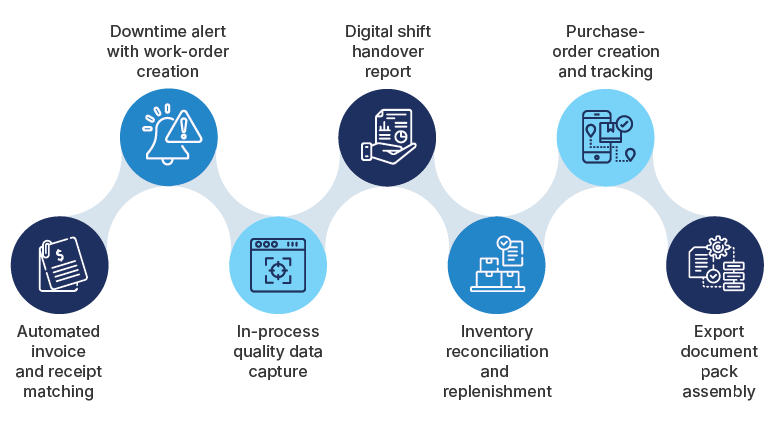Manufacturers must deliver high-quality products at a lower cost while managing labor shortages and complex supply chains. Many routine tasks, such as re-entering orders, typing inspection results and updating inventory, still rely on manual work that slows operations and leads to errors. Robotic Process Automation (RPA) uses software robots to handle these tasks and frees teams to focus on higher-value activities.
In a survey by the Capgemini Research Institute, 54% of manufacturers reported saving more than 20% in costs after adopting digital technologies such as RPA.
Integrating RPA across key workflows ensures consistent output quality, faster production cycles, and greater operational reliability. In this blog post, we’ll explore the role of robotic process automation in manufacturing, the types of processes it can support, the tangible benefits it brings, and real-world examples of manufacturers integrating RPA successfully. If you’re weighing an RPA initiative, this guide will help you make informed decisions while avoiding common pitfalls.
What is the role of RPA in manufacturing?
Modern factories run complex machines and software, yet many digital tasks still require people to move data between screens. RPA uses software robots to sign in to existing applications, transfer information, validate entries and send notifications, all without changing core systems.
RPA removes repetitive work from order processing, quality checks, inventory reconciliation, and maintenance scheduling. Bots follow preset instructions: they enter or extract data, compare values with set thresholds, and trigger the next step in a workflow.
Manufacturers often start with a single process, such as matching invoices, measuring the time saved and then copying the same bot to other lines or facilities. As these robots run inside current interfaces, teams avoid long downtime and costly system upgrades.
The results are clear: fewer errors, faster task completion and up‑to‑date data that managers can trust. Reliable information supports better planning, quicker issue resolution and stronger customer commitments, which is why RPA now plays a key role in modern manufacturing operations.
Key benefits of using RPA in manufacturing
Independent research and field results show that software robots reduce effort, speed up information flow, and strengthen governance without halting production for major retrofits. Below are six benefits often highlighted by plant managers and finance leads.
-
Lower overhead
Automated data entry, validation, and reconciliation replace large blocks of clerical work. A McKinsey review of 24 industrial companies found that automation initiatives cut indirect costs by 15-20% within a year of deployment.
-
Faster transaction processing
When a purchase order, invoice, or quality certificate reaches the system, a bot posts the details immediately. Plants report shorter queue times for approvals and quicker hand-offs to suppliers or customers, improving on-time delivery and cash-flow predictability.
-
Higher data accuracy
RPA bots follow the same validated steps each cycle, eliminating manual entry mistakes. With fewer errors to correct, supervisors can focus on analyzing trends and improving processes.
-
Real-time inventory visibility
Bots update stock levels and material movements as events occur, giving planners current figures for scheduling and procurement. Lean buffers become easier to manage, and emergency line stoppages caused by missing parts decline.
-
Audit-ready record keeping
Each robot action is time-stamped and stored in an immutable log. Regulatory and customer auditors can trace transactions without extra spreadsheet work, reducing the time staff spend preparing records.
-
Easy to scale
Once a workflow is mapped, the same script can be copied to another line or site with only minor field or path adjustments. Repeatable bots let manufacturers scale automation gradually and avoid major IT undertakings.
What type of tasks can RPA handle in manufacturing?
RPA delivers the greatest value on activities that follow clear rules and rely on information already stored in plant software. The typical opportunities fall into three practical groups, outlined below. Each example is drawn from real implementations in industrial settings.
Back-office operations
- Capture vendor invoices, run the three-way match, and post entries to the ERP for approval.
- Create purchase orders from MRP suggestions, attach specifications, and email them to suppliers.
- Validate time-sheet records against shift logs, update payroll, and flag anomalies for review.
- Compile period-end reports, pull figures from multiple ledgers, and distribute the final pack to finance and plant managers.
Shop-floor support
- Update bills of materials when engineering changes are released, syncing PLM and MES records.
- Enter quality inspection results, compare readings to tolerance tables, and issue non-conformance tickets when limits are exceeded.
- Collect machine log files, classify first-level faults, and open work orders for maintenance, if needed.
- Prepare a shift summary that pulls sensor data, throughput totals, and downtime notes for the incoming team.
Supply chain and logistics
- Reconcile stock balances between warehouse and production zones, then create replenishment requests for items below the threshold.
- Retrieve tracking information from carrier portals and push revised arrival times to the customer service dashboard.
- Populate export documents by drawing item, weight, and destination data directly from the sales order record.
7 high-impact RPA use cases that drive measurable value inside the plant
Software robots excel when a process is repeatable, data-heavy, and tied to clear business rules. The following RPA use cases show how targeted automation removes digital friction that slows production, service, and supply performance. In most cases, the gains come from tighter data capture, faster handoffs, and more consistent execution across plants and partners.
-
Automated invoice and receipt matching
Bots read each supplier invoice, compare the amounts with the purchase order and warehouse receipt, and post approved vouchers into the ERP. Faster matching shortens payment cycles and can unlock early-payment discounts.
-
Downtime alert with work-order creation
RPA bots monitor machine alarms, log the event in maintenance software, attach diagnostic details, reserve spare parts, and notify on-call technicians. Immediate ticket creation ensures increased machine availability through fast repairs.
-
In-process quality data capture
After every test, bots pull the reading and compare it with the allowed limit. If the value is outside range, they notify the quality lead and place the item on hold. Noticing deviations early prevents scrap and maintains high yield on the first run.
-
Digital shift handover report
During each shift handover, a bot gathers key metrics such as throughput, scrap and downtime, then pulls operator notes from digital forms. It emails a clear report to the next team before the new shift starts. Consistent handovers cut guesswork and speed corrections.
-
Inventory reconciliation and replenishment
Between shift changes, bots compare stock counts in ERP, warehouse records, and production-area barcode scans. Any mismatch is fixed automatically, and when stocks fall below a minimum threshold, a trigger is activated for reorder. Accurate balances stop surprise shortages and reduce excess inventory.
-
Purchase-order creation and tracking
When a requisition is approved, a bot fills in vendor details, attaches quotes, and sends the order for digital signatures. It updates the status when every sign-off is done and emails a copy to the requester. The smooth flow keeps spare-part orders moving without manual follow-up.
-
Export document pack assembly
Bots collect the invoice, packing list, and compliance forms for each export shipment and fill in a standard template. They merge the files into one PDF and submit it to the customs portal. A complete document pack speeds clearance and avoids penalties.

5 real-world examples of RPA in action: Problems solved, and results delivered
The following real-world examples demonstrate how leading manufacturers applied RPA to solve common production and administrative challenges. Each example outlines the automated task and the measurable results achieved.
1) Agilent Technologies
A leading provider of life-science instruments and diagnostics, Agilent processes thousands of supplier invoices each month, straining accounts-payable staff and delaying payments.
Process automated:
Three-way matching of invoices, purchase orders, and goods-receipt data, including variance checks and automatic posting to the ERP.
Outcome:
- Invoice handling time cut by 50%
- Fewer late-payment penalties and early-pay discounts captured
- Finance staff redeployed to analysis and supplier management
2) Siemens
At its relay plant in Berlin, Siemens faced a costly unplanned downtime because fault data remained trapped on machine terminals. Technicians had to log on to each fault manually, delaying maintenance and driving up expenses.
Process automated:
Bots monitor line-sensor alarms, create work orders in the CMMS, attach diagnostics, reserve spare parts, and alert on-call technicians.
Outcome:
- Mean time to repair reduced by up to 40%
- Higher overall equipment effectiveness through faster response
- Maintenance actions fully documented for reliability analysis
3) Unilever
The consumer goods group found mismatches between SAP inventory records and physical counts, leading to stock-count variance and line-side shortages.
Process automated:
With every shift change, bots reconcile SAP balances with barcode-scanner data from warehouse and production zones, post adjustments, and raise replenishment requests.
Outcome:
- Stock-count variance lowered by 18%
- Planners gain near real-time visibility into usable inventory
- Fewer emergency material transfers and production stoppages
4) Schneider Electric
Slow, manual approval chains for maintenance and MRO orders delayed critical spare-part deliveries across global plants.
Process automated:
Bots assemble purchase orders with supplier quotes, verify budgets, route documents through electronic sign-off, and release approved orders.
Outcome:
- Purchase-order cycle time cut from four hours to two minutes
- Improved compliance with contract terms and approval policies
- Procurement staff freed for strategic sourcing activities
5) Johnson & Johnson
Global shipping teams spent a substantial time assembling export documentation, increasing the risk of errors and customs delays.
Process automated:
Software robots collect invoices, packing lists, certificates of origin, and export declarations, populate templates, merge files, and submit complete packs to customs portals.
Outcome:
- Annual savings of approximately ten million dollars in labor and penalty avoidance
- Faster customs clearance and on-time deliveries
- Consistent, audit-ready trade-compliance records
Why choose Softweb for your RPA implementation?
Softweb delivers end-to-end RPA consulting services that turn manual tasks into dependable digital workflows. Our track record, manufacturing focus and ready-made accelerators make us a practical choice for first pilots or full scale-ups.
What you can expect from a Softweb engagement:
Structured discovery – We audit workflows and prioritize automation for existing systems.
Rapid deployment toolkit – Connectors and templates accelerate production bot deployment.
Governance built in – Dashboards keep every bot secure, visible and audit ready.
Change management support – Workshops drive adoption and gather frontline improvement ideas.
Sustainable scaling – Phased roadmap grows automation without hindering operations.
Softweb’s plant-focused approach places us among the trusted robotic process automation companies in the USA. If manual and repetitive processes are draining your time and resources, schedule a discovery call to learn how a tailored automation plan can deliver quick wins and long-term value.






